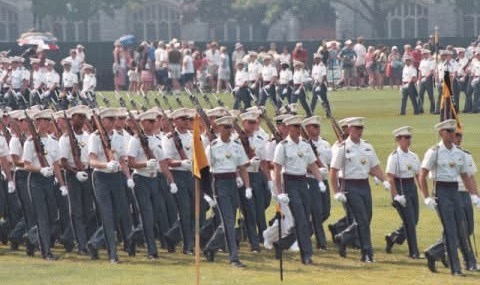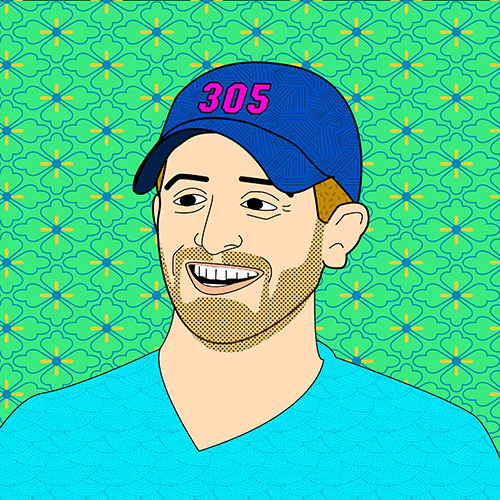This is the fourth essay in a five-part series. To read the previous piece, see here.
Reorgy Week
At the tail end of Beast, my squad sat on the ground beside Lake Fredrick, the field camp where we’d spent the last several weeks, backs against our rucksacks. The following morning augured the last day of Beast 2, but we wouldn’t get much sleep that night. We had camo paint on our faces, rifles in our laps, rucks full of gear, and were preparing to march 20 miles back to the barracks well before the break of dawn.
Sitting in a circle, we discussed what we’d do when we finally went home. Some dreamed of eating enormous meals. Others wanted to sleep for days alone or with significant others. I just wanted to sit on a large comfy chair, forearms on the armrests, and do absolutely nothing, think nothing, just vegetate. To this day, whenever life gets particularly tough, I often think back to that time and appreciate the fact that at least I can sit down in peace.
I looked down at my hands and, in the harsh, diffuse light emanating from a floodlight somewhere in the distance, didn’t recognize them. They were calloused, scratched, and filthy. The quantity of dirt under my fingernails could’ve fertilized a country garden. I wondered what other parts of myself would feel alien by the end of Beast.
We slung the rucksacks onto our backs at three in the morning. It was a clear, warm moonless night. The squad jostled into formation, and we started marching back toward campus and the next phase of our time at West Point.
The march felt interminable. Trudging up the steeper hills, I bent 90 degrees at the waist to keep my momentum going, rifle tucked into my elbows and across my chest, sweat pouring down my nose. We stopped just as the first rays of light broached the horizon, a mile from campus. Adrenaline counteracted our exhaustion when we transitioned into a marching column, shoulder to shoulder, four across. I looked back at the seemingly endless New Cadet Corps arrayed down the road behind. People flashed ragged smiles at each other. We were close and we knew it. A drum major struck up a beat and we sang cadence as we marched through Washington Gate, past West Point Cemetery, and onto the parade ground.
But we weren’t nearly done. The end of Beast marked the beginning of Reorganization, or Reorgy (pronounced with a hard “g,” you pervert), Week. This was an out of the frying pan into the fire situation. While New Cadets outnumbered cadre 10 to one during Beast, with the rest of the Corps of Cadets returning to campus, we were now outnumbered by a factor of four. And many of those new faces were licking their lips at the chance to haze the shit out of us. We wouldn’t be officially accepted into the Corps and promoted from New Cadets to Cadet Privates until we made it to the end of this new trial.
Most of my Beast platoon (Fourth Platoon, Second Company) was assigned to Bravo Company, Fourth Regiment, also known as the B-4 Buffalos. Companies were West Point’s equivalent of Hogwarts houses. We ate, slept, studied, and trained together. Different companies had different cultures. Some were infamous for their hazing. Others were more academically, militarily, or physically oriented. B-4 was thought to be a relatively lax company with strong unit cohesion, but that didn’t really matter during Reorgy Week.
Oh no, as soon as we entered the barracks, put down our gear, showered, and changed, it was a nonstop hazefest reminiscent of R-Day and the earlier days of Beast 1. There was lots of yelling, pushing, and spittle flying into our faces. In the midst of all this, I met Cadet Corporal Bobby Collins, a short, stocky Georgia boy with freckles, buzz cut blonde hair, and a perennial shit-eating grin.
When Corporal Collins first burst into my room, I bolted out of my desk into parade rest and shouted, “Go Buffalos, Corporal!” He chuckled and waved away my formality.
“Yeah, none of that, Otazo,” he beamed. “I’m your new Team Leader and it’s my job to turn you into a proper Cadet. We’re going to have a lot of fun.”
His smile widened.
“Take a look inside your desk drawer,” he said.
I did as I was told, opened the drawer and saw a pair of energy bars and a big bottle of Powerade. I was speechless.
“Is this..” I started, dumbfounded by the unexpected kindness.
“For you, yeah,” said Corporal Collins. “You look like shit. I figured you could use some food and hydration. Settle in, memorize the meals and days so the Cows don’t haze you too bad, and come find me when you’re ready. I’ll show you the ropes around here.”
“Thank you, Corporal! And go Buffalos!” I cried again as he strode out the door.
“Yeah, go Buffs,” he responded over his shoulder.
Following Reorgy Week, West Point freshmen were christened Fourth Class Cadets, more commonly known as plebes. This was derived from the word “plebeian,” the riff raff, the lowest of the low, the bottom of the hierarchical totem pole. Each plebe was assigned a Team Leader from the sophomore class, who were called “Yearlings” or “Yucks” in West Point parlance. Good Yucks guided and mentored their plebes throughout their first year, acting as something between a supervisor, guidance counselor, mentor, and older sibling. Corporal Collins was the best Team Leader I could hope for.
Beyond shepherding me through plebe year’s hazing mine field, Corporal Collins helped me prioritize my purposefully overwhelming academic schedule. He guided me through my lowest lows and encouraged me to focus on one day at a time. He was also outrageously funny, taking every opportunity to screw with me. During the academic year, the Corps wore Battle Dress Uniform (BDUs), the classic green Army camo, on Fridays. Plebes stood at parade rest in morning formation while the upperclassmen milled about.
That first Friday, Corporal Collins stomped over to me with an enormous grin and demanded, “Otazo! Do you know what day it is?”
“It’s Friday, Corporal…”
He didn’t let me finish before delivering a quick kick to the shin.
“Wrong, Otazo!” he cried. “It’s BDU Friday!”
Incensed, I tried to kick him back, but he reminded me, laughing the entire time, “No, Otazo! You can’t move! You’re a plebe and you can’t get out of formation!”
He kicked me every Friday for the rest of the semester, and you’d better believe I kicked my own plebe every BDU Friday the following year.
Laundry duty was Reorgy Week’s premier hazing event. After dinner, the upperclassmen shoved all 40 of us into a single room with 160 toddler-sized bundles of laundry and a corresponding amount of dry cleaning on hangers—one for every member of the company. We had mere minutes to systematize them all by rank and alphabetical order. The highest-ranking senior (Firstie) got their laundry first, followed by all their peers. First came the corps staff, followed by regimental and battalion officers. At the company level, we started with the company commander and executive officer. As there were four Firstie platoon leaders, those were done in alphabetical order. The same applied to the Cows and then the Yucks. Only then would the plebes get their laundry. It was fiendishly difficult to organize, and every few minutes, the upperclassmen would bang on the door, berate us for taking too long, and then get us all on the wall for another epic bout of hazing. That first night, we delivered a single bundle of laundry, which was honestly a big win.
As the week wore on, we mapped out the upperclassmen’s rooms, concocted a working system, and delivered most of the Firsties’ and Cows’ laundry. The Yucks snuck in during the day to take their bundles because they were tired of waiting for clean clothes. We did this every night for the rest of plebe year.
Acceptance Day came at the end of Reorgy Week. The entire Corps of Cadets donned white shirts, gray slacks, and white caps, grabbed their rifles, and marched onto the parade ground and into a stiflingly hot and humid morning. In the bandstand, a thousand New Cadets’ parents cheered their sons and daughters. My own were shocked to see a dozen of us fall flat on our faces, while many others struggled to hold up their weak-kneed classmates by pressing into their shoulders from either side.
The parade ended, we marched into the barracks, and I was officially promoted to Cadet Private. According to official Army doctrine, I now outranked: “The Superintendent’s dog, the Commandant’s cat, the waiters in the Mess Hall, the Hell Cats, the Generals in the Air Force, and all the Admirals in the whole damned Navy.” This marked a seminal moment in my rise from New Cadet Candidate to New Cadet to Cadet Private to Cadet Private First Class to Cadet Corporal and to Cadet Sergeant before topping off my military career as a Cadet Platoon Sergeant.
My parents were shocked when they saw me remerge from the barracks. I was pallid, rail-thin, and wobbly. The bags under my eyes were the size of saucers. All around, plebes burst into tears upon seeing their families, and I was one of them. I hugged them both, tears streaming down my cheeks. Plenty of newly minted Cadets quit right there on the parade ground. I heard one announce to his girlfriend he was done while his parents tried to convince him to stay.
When my parents asked me what I wanted to do, my sole, monosyllabic answer was, “sleep.” They bundled me into their rental car, where I fell asleep. Then they took me to a local diner, where I ate a large pizza and fell asleep. At last, they brought me to their hotel room, where I fell asleep again. I silently cried some more when they dropped me back at the barracks. I wouldn’t see them for another four months when they next visited campus for Plebe Parent Weekend.
Parting Thoughts
Beast sucked. There’s no way around it. But I do not remotely regret it. I’m proud I graduated Cadet Basic Training. It was the most difficult challenge I’d overcome to that point, though I later faced much worse during my tenure on the Hudson. I grew up very fast over those two months. I became stronger, more mature, and more certain of my abilities than any of my friends who spent the summer messing around before packing off to college. I think many able-bodied people would benefit from a similar, if somewhat less sadistic experience.
I absorbed Beast’s challenge to serve in adversity. I still serve my country, community, and the environment, though not in the military. Almost every weekend, I trudge into the mangroves to pick up hundreds of pounds of other people’s trash in the same camo pants I wore around Lake Fredrick two decades ago.
My experience at West Point more broadly is a different can of worms, something beyond the scope of this piece. You can read more about that here if you like, assuming anyone made it to the end of this unintentional novella.
To that point, the essay you read ballooned from a quick lark to a behemoth clocking in at more than 14,000 words. So, why write it? And why now after 20 years?
Firstly, I was reading Joseph Heller and so much of what he described sounded uncannily familiar. Secondly, I want to remember my experience. 20 years removed from R-Day, it can seem like a dream, a life lived by another person. To some extent, that’s true. But again, I lived that insanity, that physical, psychological, and emotional crucible that formed the man I am today. I don’t want to forget it. Not even the outrageous, transcendental, or darkest parts of the experience. I also think it makes for a hell of a story.
Now, if you’ll excuse me, I need to email this article to my therapist and ask her what it all means.
In Memoriam
1st Lieutenant Bobby Collins was killed in action on April 7, 2010, in Mosul, Iraq when his vehicle was caught in the blast of a roadside bomb. He was 24. I didn’t tell you about his death until now because I wanted you to get to know him, love him, the way I did. I wanted you to understand the wonderful leader and mentor he was to me without burdening you with the grief I feel at his demise. I miss him so much it viscerally hurts, a hot coal burning down my throat, through my chest, and down to my gut. Even now, writing this at 1:43 in the morning, fighting and failing to stop the tears, it hurts. I never got to thank him before I left West Point. And I never will. I miss him so, so much, and I always will.
1st Lieutenant Daren Hidalgo died on February 20, 2011, in Kandahar, Afghanistan from wounds sustained during an improvised explosive device attack. He was 24. You didn’t meet him during the narrative, but he was kind and funny and always had an enormous smile on his face. We were in the same Beast company and took a mandatory gymnastics class together. He was also a proud Dominican American, a small raft of ethnic and linguistic normality in a sea of sometimes hostile white faces. He was a good friend. I will always miss him.
1st Lieutenant Tim Cunningham was killed in Balad, Iraq on April 23, 2008, when his Humvee rolled into a canal. He was 26. You didn’t meet him either, but he was my first platoon leader and everything a true leader should be. He pushed me to be better without cruelty. He took pride in watching me grow. I will always miss him.
Be thou at peace.
. . . . .
This is the final of a five-part series of essays recounting my experience during West Point’s Cadet Basic Training.
If you like our stories, check out The Miami Creation Myth hardcover.




